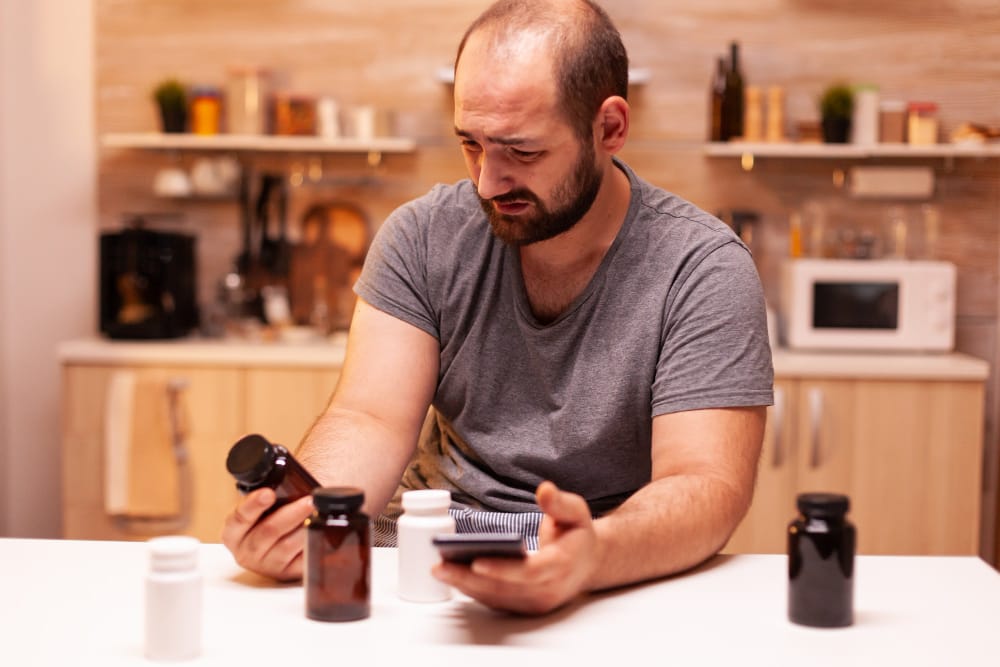FREE SHIPPING OVER $50
URGENT WARNING: 5 Supplements You MUST AVOID If You Have High Blood Pressure (Experts Reveal Why!)
If you live with high blood pressure, also known as hypertension, you already know how critical it is to manage your condition. You likely monitor your diet, engage in regular physical activity, and perhaps take prescribed medications to keep your numbers in check. But here’s something you might not have considered, and it’s a critical oversight for many: the supplements you take could be secretly working against you.
In the health and wellness world, supplements are often seen as harmless or even universally beneficial. However, when you have a serious condition like high blood pressure, certain ingredients – even “natural” ones – can interact dangerously with your medications, interfere with your body’s natural blood pressure regulation, or directly elevate your blood pressure to unsafe levels. It’s a hidden minefield, and many people are unaware of the risks they’re taking.

Understanding High Blood Pressure and Why Supplement Choices Matter
High blood pressure is a silent killer. It often has no obvious symptoms, yet it significantly increases your risk of heart attack, stroke, kidney disease, and other serious health complications. Managing it effectively is paramount, and that includes being incredibly vigilant about everything you put into your body.
The problem with supplements is that they are not regulated by the Food and Drug Administration (FDA) in the same way as prescription medications. This means:
- Varying Quality: The amount of active ingredient can differ wildly between brands, and some may contain undisclosed ingredients.
- Lack of Testing: Many supplements haven’t undergone rigorous clinical trials for safety and efficacy, especially in individuals with pre-existing health conditions.
- Potential Interactions: “Natural” doesn’t mean harmless. Supplements can have powerful physiological effects and interact negatively with medications or other supplements.
When you have high blood pressure, your cardiovascular system is already under strain. Introducing substances that can constrict blood vessels, increase heart rate, or interfere with fluid balance can have dangerous, even life-threatening, consequences.
The 5 Supplements You MUST AVOID If You Have High Blood Pressure
It’s critical to remember: always consult your doctor or pharmacist before starting or stopping any supplement, especially if you have high blood pressure or are taking medications.
1. Licorice Root (Glycyrrhiza glabra)
You might find licorice root in herbal teas, digestive aids, or even as a flavoring in some candies (though less common in modern confections). It’s often promoted for its anti-inflammatory properties and for soothing digestive issues.
- Why it’s dangerous for high blood pressure: The primary active compound in licorice root, glycyrrhizin, can mimic the effects of aldosterone, a hormone that regulates blood pressure by controlling salt and water balance in the body.
- Sodium Retention: Glycyrrhizin causes the kidneys to retain sodium (salt) and lose potassium.
- Increased Blood Volume: Sodium retention leads to increased fluid retention, which in turn increases blood volume.
- Elevated Blood Pressure: More blood volume means more pressure on your blood vessel walls, directly leading to an increase in blood pressure. This effect can be significant and dangerous for someone already dealing with hypertension.
- Forms to watch out for: Licorice root extracts, deglycyrrhizinated licorice (DGL) is safer as the glycyrrhizin is removed, but always check. Herbal teas containing licorice root.
- Expert Insight: Cardiologists frequently warn against licorice root for hypertensive patients due to its potent mineralocorticoid-like effects. The risk increases with higher doses and prolonged use.
2. Ephedra (Ma Huang) / Bitter Orange (Synephrine)
These stimulants were once popular in weight loss and energy-boosting supplements. Ephedra was banned by the FDA in 2004 for its severe side effects, but similar compounds like bitter orange (containing synephrine) are still found in some products.
- Why they’re dangerous for high blood pressure: Both ephedra and synephrine stimulate the sympathetic nervous system – your “fight or flight” response.
- Increased Heart Rate: They directly increase your heart rate.
- Blood Vessel Constriction: They cause your blood vessels to narrow (vasoconstriction).
- Sudden Blood Pressure Spikes: This combination of increased heart rate and constricted blood vessels can lead to a sudden and dangerous spike in blood pressure, putting immense strain on your heart and arteries.
- Forms to watch out for: Weight loss supplements, energy boosters, pre-workout formulas. Often listed as Citrus Aurantium (bitter orange), synephrine, or various herbal “fat burners.”
- Expert Insight: Anything designed to give you a powerful ‘jolt’ or significant energy boost should be viewed with extreme suspicion if you have high blood pressure. These stimulants directly overload your cardiovascular system.
3. High Doses of Caffeine Supplements / Energy Drinks
While a moderate amount of coffee might be okay for some, highly concentrated caffeine supplements (like pills) and mega-dose energy drinks are a different story.
- Why they’re dangerous for high blood pressure: Caffeine is a stimulant that can cause a temporary but significant increase in blood pressure.
- Blood Vessel Narrowing: It can temporarily narrow your blood vessels.
- Increased Heart Rate: High doses can also significantly raise your heart rate and cause palpitations.
- Cumulative Effect: If you’re already taking blood pressure medication, high doses of caffeine can counteract its effects or lead to dangerously high spikes, especially if consumed quickly.
- Forms to watch out for: Caffeine pills, highly concentrated energy drinks (often labeled with warnings), certain pre-workout supplements.
- Expert Insight: “While many people tolerate a cup or two of coffee, concentrated caffeine products can be a real problem for hypertension,” states a cardiologist.
4. St. John’s Wort (Hypericum perforatum)
This herbal supplement is commonly used for mild to moderate depression and mood disorders.
- Why it’s dangerous for high blood pressure: St. John’s Wort is a potent inducer of certain liver enzymes. This means it can accelerate the metabolism (breakdown) of many prescription medications, including some common blood pressure medications.
- Reduced Medication Effectiveness: By speeding up the breakdown of your blood pressure medication, St. John’s Wort can significantly reduce its effectiveness, causing your blood pressure to rise uncontrolled. This interaction is well-documented and potentially very serious.
- Forms to watch out for: Capsules, tinctures, or teas marketed for mood support.
- Expert Insight: “Even if a supplement doesn’t directly raise blood pressure, its interaction with your prescribed medications can be just as, if not more, dangerous,” advises a pharmacist. “St. John’s Wort is a classic example of an herb that renders vital medications ineffective.”
5. Decongestants (e.g., Pseudoephedrine, Phenylephrine) in Cold & Flu Supplements
Often found in over-the-counter cold and flu remedies, these are not typically thought of as “supplements” but are commonly consumed in supplement-like forms.
- Why they’re dangerous for high blood pressure: Decongestants work by constricting blood vessels in your nasal passages to reduce swelling and clear congestion. This vasoconstriction, however, is not limited to your nose.
- Systemic Vasoconstriction: They constrict blood vessels throughout your entire body.
- Elevated Blood Pressure: This widespread constriction directly increases systemic blood pressure, making your heart work harder to pump blood through narrowed arteries. For someone with already high blood pressure, this can lead to a dangerous spike or exacerbate their condition.
- Forms to watch out for: Cold and flu pills, nasal sprays, and multi-symptom relief products that contain ingredients ending in “-ephrine” or “-fedrine.”
- Expert Insight: Always check the label for decongestants if you have hypertension, and look for ‘blood pressure friendly’ or ‘non-drowsy’ alternatives which often contain different active ingredients.
Your Heart Health Comes First: Be Vigilant!
The world of supplements can be confusing, and it’s easy to assume that if something is available over the counter, it must be safe. For individuals with high blood pressure, this assumption can be incredibly risky. These 5 supplements are just a few examples of common offenders.
Your best defense is always to:
- Communicate with Your Doctor: Before taking any new supplement, discuss it with your healthcare provider or pharmacist. They know your medical history and current medications.
- Read Labels Carefully: Become a savvy label reader. Recognize the common names of these problematic ingredients.
- Prioritize Proven Treatments: Focus on your prescribed medications, dietary changes, and lifestyle modifications that your doctor has recommended. Supplements should never replace these foundational elements of high blood pressure management.
Related Articles
- Fatigue, Weakness, and Dizziness: If You Have These Symptoms, You Are Missing This Vitamin
- Always Tired? The Vitamin Deficiency Most Adults Have That Steals Your Energy (And How to Fix It!)
- Is Psyllium Husk the Safer and More Affordable Ozempic Alternative No One Talks About?
- Big Beauty’s Dirty Secret: The Skincare Vitamin Linked to Liver Failure
- Stop Wasting Money: These 5 Popular Supplements May Wreck Your Kidneys, Experts Warn



